We all navigate life’s changes, some that we plan diligently for and others that catch us completely off-guard. Unplanned life changes often times induce panic and cause us to react under duress in dealing with crisis or uncertainty. However, many times it truly doesn’t have to be that way! While you can’t necessarily plan out all of the details for dealing with unexpected situations in advance, you CAN build your knowledge of and awareness about resources that are available to connect with should certain things occur.
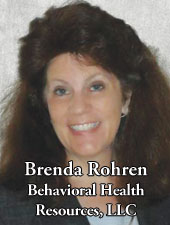 Coping with life’s unplanned changes in general can be quite trying, but it’s necessary to move forward past the change itself to everything that will happen afterwards as a result. “Individuals often experience negative unplanned life events that are very challenging,” asserts Brenda Rohren, Certified EMDR Therapist and President of Behavioral Health Resources, LLC. “These include loss of employment, diagnosis with a serious health condition, family disruption after disclosure of sexual abuse, domestic violence, or being charged with a criminal offense (e.g., DUI, possession of a drug) with resulting consequences such as probation, loss of driver’s license, etc. Other events include military deployment (to include pre- and post-deployment) or change in permanent duty station for military personnel and their families.
Coping with life’s unplanned changes in general can be quite trying, but it’s necessary to move forward past the change itself to everything that will happen afterwards as a result. “Individuals often experience negative unplanned life events that are very challenging,” asserts Brenda Rohren, Certified EMDR Therapist and President of Behavioral Health Resources, LLC. “These include loss of employment, diagnosis with a serious health condition, family disruption after disclosure of sexual abuse, domestic violence, or being charged with a criminal offense (e.g., DUI, possession of a drug) with resulting consequences such as probation, loss of driver’s license, etc. Other events include military deployment (to include pre- and post-deployment) or change in permanent duty station for military personnel and their families.
Unplanned changes may happen suddenly or gradually. Some changes occur with no warning, such as a car accident or rape. However, most change occurs in small, steady increments with the most significant impact occurring at the culmination of the change. An example would be helping your adolescent to prepare for graduation from high school with transition to college. Although the family has been working towards these goals for a while, the most difficult aspect of the change for the parents might be after the young adult has left home and is no longer part of their daily lives. Other milestones in family life can also be challenging, such as marriage, birth of a baby, and retirement. Even if a person otherwise has good coping skills, when faced with a challenging unplanned event (or unrealistic expectations about how their lives would change even with a positive event), it is common for individuals to cope in maladaptive ways. Types of unhealthy coping include drug or alcohol use, excessive spending, or other mood altering behaviors such as overeating. The person usually experiences depression and anxiety, which begin to interfere with daily functioning. They continue to use the negative behaviors to cope, thus beginning a vicious cycle with significant decrease in life satisfaction.
When challenging unplanned life events occur, receiving outpatient treatment from a licensed behavioral health therapist can be an effective option. The ideal therapist would be one who is dually licensed in mental health and substance use issues (i.e., LIMHP, LADC). At Behavioral Health Resources, LLC, we specialize in assessment and treatment of these co-occurring disorders as well as the underlying issues of trauma and adverse life events. We evaluate the person’s strengths and develop a plan to obtain balance in all areas of the person’s life and increase life satisfaction. Some of the approaches used include Cognitive Behavioral Therapy (CBT), Motivational Interviewing, and EMDR therapy. Treatment is individualized for all clients based on their strengths, needs, abilities, and preferences. Our outpatient programs for youth and adults are CARF-accredited. This means that we conform to CARF standards that focus on person-centered care and high quality of services.”
She further advises, “When a person is having difficulty adjusting to the change, talking to another person can be a good way to obtain a “reality check” and obtain validation and support. Barriers to this could be lack of a safe, healthy support system. Even if a person does have others in whom they can confide, members of the support system may be unavailable or not able to provide objective listening and problem-solving. Often members of the support system are themselves emotionally involved with the situation and have an inherit bias.
You don’t have to experience life transitions and unplanned changes alone. Finding a therapist who can understand your needs and perspective is an important first step. At Behavioral Health Resources, LLC we offer a no-cost consultation session to meet with the therapist, become acquainted, and determine if this professional has the expertise and experience to help you change a challenging event into a new opportunity for growth. To learn more about our services, contact Brenda Rohren at (402) 486-1101 or brenda@bhr-llc.com.”
There are crucial decisions that need to be made in response to unplanned life changes, even in less than desirable conditions and when you’d rather not deal with the issue right away. Or as the saying goes, “Hindsight is always 50/50” – it’s better to be prepared to make a decision rather than looking back and regretting how you responded at the time. Forcing yourself to make smart decisions and to be aware of what must be done to move forward can be difficult but will provide you a much better outcome in the future, so you’ll likely be thankful that you took action once the initial emotional response fades.
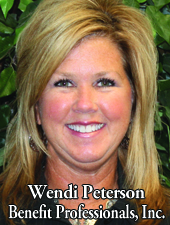 “The most common unplanned life changes that we see from our clients at Benefit Professionals would be the loss of coverage through an unplanned loss of job or the tragedy of death,” adds Wendi Peterson of Benefit Professionals, Inc. “The most difficult aspect of these unplanned life changes is being notified in a timely fashion. When unplanned life changes occur for an employee, often the last thing on their mind is their benefits. We continually educate our employer groups and employees through correspondence and communication at employee meetings/renewals. It’s important that we’ve not only educated the employer to notify us of any unplanned life changes, but that the employee notifies his or her employer.
“The most common unplanned life changes that we see from our clients at Benefit Professionals would be the loss of coverage through an unplanned loss of job or the tragedy of death,” adds Wendi Peterson of Benefit Professionals, Inc. “The most difficult aspect of these unplanned life changes is being notified in a timely fashion. When unplanned life changes occur for an employee, often the last thing on their mind is their benefits. We continually educate our employer groups and employees through correspondence and communication at employee meetings/renewals. It’s important that we’ve not only educated the employer to notify us of any unplanned life changes, but that the employee notifies his or her employer.
In the event that an unplanned life change occurs and the employer or employee hasn’t given proper notification of the circumstance to us, we fall back on our relationships with our carriers. Years of relationship building helps when dealing with changes that go unreported or reported beyond normal time restraints. Unfortunately, ACA regulations put strict time restraints on the carriers for allowing changes. We deal with any of these types of circumstances directly with appropriate insurance carrier on the behalf of our clients. Communication is the key and the success to the implementation of these changes.”
 Unexpected expenses have the tendency to disrupt our lives, so it only makes sense that budgeting and saving are the two best ways to proactively approach financial security. “Everyone is working within a budget so when something goes wrong, it’s can be a huge issue,” emphasizes David Duff, a local Farm Bureau Financial Services agent. “I help my clients to weigh their options regarding what will make life more affordable, focusing on what’s best for the future and where they should consider allocating their money to reach their goals.
Unexpected expenses have the tendency to disrupt our lives, so it only makes sense that budgeting and saving are the two best ways to proactively approach financial security. “Everyone is working within a budget so when something goes wrong, it’s can be a huge issue,” emphasizes David Duff, a local Farm Bureau Financial Services agent. “I help my clients to weigh their options regarding what will make life more affordable, focusing on what’s best for the future and where they should consider allocating their money to reach their goals.
My goal is to find solutions and ways to address budgetary concerns so that when unplanned life changes occur that they don’t break my clients. Many times these are small hiccups, like making sure if overtime isn’t guaranteed that the car payment is still affordable, but sometimes they are on a larger scale that would necessitate slimming down what they’re paying into things or whether they should take on a loan to manage their expenses. My grandpa always taught me if you’re prepared for the worst and anything goes better than that, you’re in a good position. While it’s unfortunately somewhat of a pessimistic outlook, it has served me well in helping my clients.
My best advice is to make sure you are working with a professional who can help with your due diligence as well as setting up an effective strategy to deal with unplanned changes when they pop up. It’s always easier to take a small step back and assess the situation rather than to jump off a cliff and then re-climb it. We get in the habit of overextending ourselves, whether in keeping up with the Joneses or simply being looser with our money when we feel that we are at a comfortable point financially. I help people to make smarter decisions with their money, because that will is what keeps them away from struggle and better able to handle life’s unexpected changes. Moreover, I offer an outside perspective and my objectivity combined with my expertise allows me to set up my clients for success.”
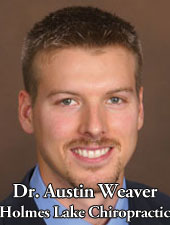 There are a lot of unplanned occurrences that have the potential to affect employment, which in turn affects financial security. “Unplanned life changes can drastically affect one’s livelihood for obvious reasons,” agrees Austin Weaver, DC, owner of Holmes Lake Chiropractic. “I see people and families who have to make hard decisions due to accidents or health issues that cause them to miss or even quit work all together. Low back injuries, whiplash, or any occupational disability can all have long lasting and life changing effect.
There are a lot of unplanned occurrences that have the potential to affect employment, which in turn affects financial security. “Unplanned life changes can drastically affect one’s livelihood for obvious reasons,” agrees Austin Weaver, DC, owner of Holmes Lake Chiropractic. “I see people and families who have to make hard decisions due to accidents or health issues that cause them to miss or even quit work all together. Low back injuries, whiplash, or any occupational disability can all have long lasting and life changing effect.
These accidents or health issues add strain physically, emotionally, and financially to the individual and family. There is not only treatment and short term responsibilities, but the long term and lasting injuries that can affect your health if not dealt with appropriately. With not working and having treatment, bills can quickly add up, but is necessary for proper recovery. This is why we offer payment plans in our office to offset the stress of immediate financial responsibility, so the patient can focus on getting better. That being said, the good news is that there are ways to prepare for the unplanned and even take preventative steps.
To prepare or even prevent an unplanned life change it does not take a lot of extra work, only time and effort. The most important part is to think and take action now, instead of putting it off until it’s too late. Physically, it is important to be active and do the necessary things to keep your body functioning correctly to avoid unnecessary injury. A total of 30 minutes a day walking is a great start and avoid sitting for more than 1 to 2 hours at a time. Diet is also very important. You are what you eat, so if you eat and drink a lot of processed and sugary foods you are much more likely to suffer from health issues and physical injuries. Drinking 80-100 oz. of water a day and limiting carbohydrates, while increasing your vegetables and fruits are a quick way to improve your health and have your body working for you instead of against. Lastly, give yourself peace of mind by creating a financial plan for the unknown. Whether it’s a savings account, disability insurance, or just a way to budget if something should happen can drastically lessen stress.
As a chiropractor, it is rewarding to help people become pain free and improve their health through our care and at home suggestions. If you feel you would benefit from learning how to improve yourself mentally and physically to better avoid unplanned life changes, give us a call. We can improve how you move and feel and offer suggestions on how to do things properly to stay away from unneeded stress or injury. You can reach me at HolmesLakeChiropractic.com or at (402) 483-4409.”
Health-related changes are most generally all unplanned, and some may be resolved easily while others are more difficult to adjust to.
This includes our own health issues as well as those that our loved ones will experience. When it comes to hearing, there are several life changes that can affect the way a person copes and manages his or her daily life. An unfortunate medical diagnosis, a spouse suddenly passing; all of these events require being able to hear and understand what is happening. Those same events may have you considering a senior living community. Transitioning from your quiet dinner table to a noisy dining room can make it hard to hear conversations.
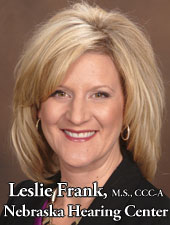 “It is important to see your Audiologist so that he or she can adjust your hearing aids to the changes in your hearing and the changes in your lifestyle,” says Leslie Frank, owner and Audiologist at Nebraska Hearing Center. At Nebraska Hearing Center, staff makes monthly visits to several of the surrounding retirement communities. This makes it easier for servicing of hearing aids for those who prefer to stay in.
“It is important to see your Audiologist so that he or she can adjust your hearing aids to the changes in your hearing and the changes in your lifestyle,” says Leslie Frank, owner and Audiologist at Nebraska Hearing Center. At Nebraska Hearing Center, staff makes monthly visits to several of the surrounding retirement communities. This makes it easier for servicing of hearing aids for those who prefer to stay in.
In the case of an unplanned event, at Nebraska Hearing Center, their role is one of support. “My goal is to make sure my patient is able to hear their very best at all times,” states Leslie. “That is especially important in challenging times.” Any changes in a client’s lifestyle are always considered. “When meeting with my patient’s, we always discuss what their expectations are for their hearing aids and their lifestyle”.
If a life changing event occurs, it is important to hear and that is where Nebraska Hearing Center comes in. They encourage preventive care and urge everyone to annually monitor their hearing so that changes can be addressed right away. At Nebraska Hearing Center, the evaluation is free, so it only makes sense to make it part of your annual routine.
Injuries are another one of life’s unplanned changes that will affect us all at one time or another. As previously mentioned, this can determine whether we are able to continue working, could be enormously costly for those with no insurance, in some cases will require a lengthy rehabilitation–essentially it impacts overall quality of life. For seniors, even slips or falls can cause serious injury that would necessitate rehabilitation or a higher level of daily care moving forward.
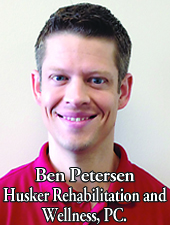 “In physical therapy we commonly see people with unexpected injuries or deficiencies,” says Ben Petersen of Husker Rehabilitation and Wellness, PC. “It can make them start to rethink everything going on in their lives. This might include their ability to perform their job duties and make money, their ability to physically take care of their kids, spouses, or parents, or their capacity to continue on with their passions or hobbies like playing golf, working out, or just sitting to read a book.
“In physical therapy we commonly see people with unexpected injuries or deficiencies,” says Ben Petersen of Husker Rehabilitation and Wellness, PC. “It can make them start to rethink everything going on in their lives. This might include their ability to perform their job duties and make money, their ability to physically take care of their kids, spouses, or parents, or their capacity to continue on with their passions or hobbies like playing golf, working out, or just sitting to read a book.
Sometimes unexpected injuries might mean finding alternative work (like moving from a production job to office work), exploring assisted living options, or learning to engage in new activities. The most difficult aspect of those unexpected injuries or life changes can be the apprehension and uncertainty that comes with them, as well as the feeling of lost identity.
With all of our clients it’s a given that we strive to return them to their prior level of function, allowing them to resume their previous activities of daily living. Some injuries are obviously more severe and detrimental to that plan. In that case, our best solution is to help restore maximum obtainable function and to help our clients find alternative methods to achieve their goals. We might also help them make appropriate modifications to their occupational performance, for example, to help them continue with their job duties. Something as simple as breaking old postural habits and providing a more appropriate ergonomic set up at work can make a big difference for people. The goal is to try to help them continue to live the life they want to!”
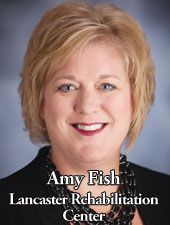 “We help those who are experiencing unplanned life changes all the time at Lancaster Rehabilitation Center,” adds Amy Fish, Administrator at Lancaster Rehabilitation Center. “Our short term rehabilitation unit is dedicated to caring for patients who have experienced both planned and unplanned hip and knee replacement procedures, unexpected cardiac surgery, and/or a decline in overall health requiring the need of our clinical and therapy services in order to get back on their feet. We are also there for those residents and families looking for secure memory support services or those in need of traditional long term care services.
“We help those who are experiencing unplanned life changes all the time at Lancaster Rehabilitation Center,” adds Amy Fish, Administrator at Lancaster Rehabilitation Center. “Our short term rehabilitation unit is dedicated to caring for patients who have experienced both planned and unplanned hip and knee replacement procedures, unexpected cardiac surgery, and/or a decline in overall health requiring the need of our clinical and therapy services in order to get back on their feet. We are also there for those residents and families looking for secure memory support services or those in need of traditional long term care services.
The most difficult aspect of an unplanned life change is the fact that it is unplanned. As such, my advice is to start the conversation early before an unexpected event occurs. Knowing that the unexpected could always happen, it’s important to take the time to plan for what might be needed in the future. Adult children should take the time to engage in conversation regarding the future care needs of their parents. Often, when something unexpected happens, we’ll find that those now making decisions on behalf of elders are unaware of things like insurance policies, care directives, or how to manage their affairs in the interim of their recovery. Research in advance the many options for care. Know and understand what is important regarding their preferences for social, spiritual, and clinical care. This will help elevate some of the anxiety and stress that occurs when managing the unexpected.
When something unexpected occurs, rely on the expertise of others to help guide the decision making process. Don’t be afraid to ask plenty of questions in order to ensure you have all the facts. Some health care providers have limitations on Medicare, Medicaid, VA, or insurance policy participation. You always want to ensure you’re taking full advantage of the benefits or programs you qualify for. And remember to take it one step at a time. Let others help in whatever way they can. Focus on the most critical decisions first, knowing that there is plenty of help available. The Lincoln community truly is resource rich, so use these many experts to your advantage. Call upon trusted physicians, outreach programs, and the many health care facilities to help guide your decision making.
The team at Lancaster Rehabilitation feels it’s important to serve as a resource to those in need of skilled care services, and other outpatient needs. Community members are welcome to call us anytime with questions. We’re glad to help!”
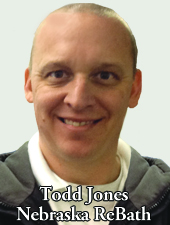 As the result of an injury, you may consider modifying your home to accommodate any mobility concerns. This is an especially helpful option for seniors who wish to continue living in the comfort of their homes. The bathroom can be a dangerous area for them to navigate, but there are innovative ways to remodel with these concerns in mind. “There are many modifications that can be made with the safety of seniors at the forefront so that they can maintain their independence and continue living in their homes comfortably,” explains Todd Jones, owner of Nebraska ReBath. “We believe that bathroom remodeling doesn’t need to be a messy, expensive headache and we focus on what we call ‘The Refreshing Remodel,’ an entirely new concept that our company has pioneered. This allows us to preserve the tranquility of your home with quiet, clean, quick and affordable bathroom remodeling. Our goal is to efficiently modify your bathroom based upon your unique requirements with minimum disruption to you and your home. Aging in place remains an option for many, and we make sure that the home’s bathroom is conducive for this to happen safely and with enhanced functionality that adds enjoyment to something that may have previously been avoided due to fear or inconvenience.”
As the result of an injury, you may consider modifying your home to accommodate any mobility concerns. This is an especially helpful option for seniors who wish to continue living in the comfort of their homes. The bathroom can be a dangerous area for them to navigate, but there are innovative ways to remodel with these concerns in mind. “There are many modifications that can be made with the safety of seniors at the forefront so that they can maintain their independence and continue living in their homes comfortably,” explains Todd Jones, owner of Nebraska ReBath. “We believe that bathroom remodeling doesn’t need to be a messy, expensive headache and we focus on what we call ‘The Refreshing Remodel,’ an entirely new concept that our company has pioneered. This allows us to preserve the tranquility of your home with quiet, clean, quick and affordable bathroom remodeling. Our goal is to efficiently modify your bathroom based upon your unique requirements with minimum disruption to you and your home. Aging in place remains an option for many, and we make sure that the home’s bathroom is conducive for this to happen safely and with enhanced functionality that adds enjoyment to something that may have previously been avoided due to fear or inconvenience.”
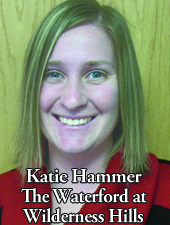 An unplanned life change is just that, something that unexpectedly happens to you or your family. These changes can be a good thing or they can be a difficult thing. “When unexpected events occur, whether you have a spouse or a parent who has fallen and needs a little extra care or they have just come to that point when they are in need of more care than you can give them, we at The Waterford Communities are here to help you make the best choices possible,” emphasizes Katie Hammer of The Waterford at Wilderness Hills. “Making sure you and your loved ones are happy and completely satisfied is our number one goal.
An unplanned life change is just that, something that unexpectedly happens to you or your family. These changes can be a good thing or they can be a difficult thing. “When unexpected events occur, whether you have a spouse or a parent who has fallen and needs a little extra care or they have just come to that point when they are in need of more care than you can give them, we at The Waterford Communities are here to help you make the best choices possible,” emphasizes Katie Hammer of The Waterford at Wilderness Hills. “Making sure you and your loved ones are happy and completely satisfied is our number one goal.
In addition to long term care, The Waterford Communities offer short term respite stays for those who need a little extra care while they are recovering after surgery or an injury. Placing your loved one into Assisted Living doesn’t mean they won’t be able to come home again or that you won’t be able to see them often. Family and friends are welcome to come and go as they please. You are able to visit your loved one whenever you would like!
There are a few things to consider when you are determining the type of care your loved one will need:
• Once they recover from the surgery or injury will they be able to go home? If not, how much extra care will they need?
• Are they able to do things on their own or are they completely dependent?
• Are they showing signs of memory loss or other issues?
• Will they need other services once they are in a facility? Ex: Physical Therapy, Home Health Aide, Hospice Care, etc.
Once you have decided the type of care your loved one will require, you then need to determine in which facility to place them. Some things to consider:
• Will they need short term or long term care?
• How much can you afford a month?
• Is it a welcoming and friendly environment?
• Does the facility provide activities that your loved one would enjoy?
• Is the facility able to provide or assist with all the care your loved one needs?
These are just a few of the many things that should be considered in placing your loved one in a facility that best fits them. The Waterford Communities is happy to sit down with you and go over all of these questions and more to help you decide the best fit for your loved one. If you go to our website, http://www.thewaterford.net, you can request and receive a free residence evaluation checklist to help you make a decision that best fits your loved one. We urge families to make the necessary calls and ask questions when unplanned life changes take place. We understand this is never an easy process, and we do our best to make it as easy and comfortable as possible for all involved.”
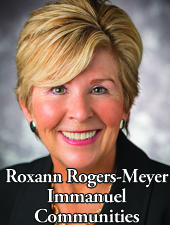 While the conversation about a move to an assisted living community can be difficult to start, the sooner the better–it’s of the utmost importance to be as proactive as possible because eventually it will be unavoidable and reacting at the crisis point isn’t ideal for anyone involved. “The Landing at Williamsburg Village, an Immanuel community, experiences the unplanned life changes of seniors every day as we work with families to find appropriate resources,” adds Roxann Rogers-Meyer of Immanuel Communities. “The health and well-being of a loved one can take an unexpected turn and families are faced with finding a senior living community that can address the immediate needs of the senior. These decisions on care and senior living options often come with complications including health status, finances, insurance, family dynamics, lack of future planning or understanding the various levels of care that are available.
While the conversation about a move to an assisted living community can be difficult to start, the sooner the better–it’s of the utmost importance to be as proactive as possible because eventually it will be unavoidable and reacting at the crisis point isn’t ideal for anyone involved. “The Landing at Williamsburg Village, an Immanuel community, experiences the unplanned life changes of seniors every day as we work with families to find appropriate resources,” adds Roxann Rogers-Meyer of Immanuel Communities. “The health and well-being of a loved one can take an unexpected turn and families are faced with finding a senior living community that can address the immediate needs of the senior. These decisions on care and senior living options often come with complications including health status, finances, insurance, family dynamics, lack of future planning or understanding the various levels of care that are available.
Sometimes we are dealing with an adult child who has just been told by the family physician that Mom can no longer live at home safely and that adult child is scrambling to find a solution. This unplanned life change is complicated by the fact that Mom and the adult child have never had a conversation about a potential move to a senior living community. The current campaign for The Landing at Williamsburg Village focuses on seniors and their adult children having an awkward conversation. It is important to have that conversation before you are dealing with a crisis situation. The conversation can include a plan for the future, understanding the choices for senior housing and senior services, detailing the financial picture, discussing end of life plans and most importantly respecting the wishes of your love one.
Our marketing and healthcare team at The Landing will partner with our prospective residents to guide them on this difficult journey to find the right approach that will bring peace to everyone involved in the decision making process. It is truly a gift to your loved ones to get the conversation started.”
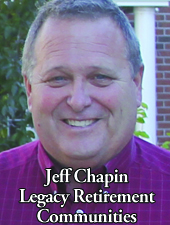 “We often visit with people who are in crisis mode when making assisted living decisions and in this case it puts more undue pressure on them,” explains Jeff Chapin of Legacy Retirement Communities. “Instead they could be enjoying the process of looking at all of the different communities and options for the one they like the most. Crisis forces people to check into this lifestyle but it doesn’t need to be that way. Far too often it comes time to move and seniors aren’t able to move to their top two selections because they’ve waited too long.
“We often visit with people who are in crisis mode when making assisted living decisions and in this case it puts more undue pressure on them,” explains Jeff Chapin of Legacy Retirement Communities. “Instead they could be enjoying the process of looking at all of the different communities and options for the one they like the most. Crisis forces people to check into this lifestyle but it doesn’t need to be that way. Far too often it comes time to move and seniors aren’t able to move to their top two selections because they’ve waited too long.
So when should you start looking into your options? The more proactive you can be about it, the better. We have people that have been on our waiting list for years because they preferred to have their ducks in a row and have already sat down and reviewed their options well before the time has come to make the move. I guarantee you that after you’ve visited the communities that you’re interested in, one of them will touch you and feel like home and that’s the one you’ll want to be able to choose for yourself.”
He adds, “Many seniors still have a misconception about assisted living because they don’t realize everything that has happened in the last 10-15 years with the amazing improvements to facilities. Facilities nowadays are far less institutionalized and ‘hospital-like,’ they’ve been carefully designed to closely resemble a home and community setting. Moving from your present home to a new home with more amenities geared towards seniors allows the enjoyment of a nice lifestyle without worrying about home upkeep or health issues.
At all of our locations we try to do the number one thing and just listen, crisis or not. We want to see what we can do for each and every person who reaches out to us. It’s a life changing process and we want to be there when we are needed and called upon. We invite everyone to our Signature Events, such as our Legacy of Learning classes, as this is another way to get a better feel for each of the communities.
Above all, remember that it doesn’t cost a thing to look into your options and that you don’t have to make all of these decisions on your own. Finding the right fit and ultimately making the move takes a lot of thought and planning, but there is plenty of help out there and our goal is to ensure that our clients have all of the information they need to make the decisions that will benefit them the most.”
Assisted living might also be optimal for someone who is experiencing memory loss or suffering from dementia-related disorders. Currently more than five million Americans are living with Alzheimer’s disease, including an estimated 33,000 Nebraska residents. As baby boomers age, the number of people living with the disease will rapidly escalate. While memory loss and the onset of dementia is generally a gradual process, many times it can be kept a secret or go under the radar (go unnoticed or not be taken as seriously as it should be, just written off as the normal progression of aging) until something bad happens.
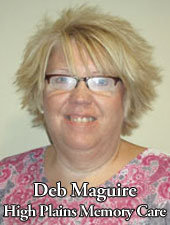 Deb Maguire, Administrator at High Plains Alzheimer’s Special Care Center, offers a few recommendations and addresses some common questions with respect to dealing with memory loss:
Deb Maguire, Administrator at High Plains Alzheimer’s Special Care Center, offers a few recommendations and addresses some common questions with respect to dealing with memory loss:
“We understand that caring for a loved one with memory loss is a difficult and challenging experience. We also understand the decision to place a loved one in the care of others is perhaps the most difficult decision you will ever make. High Plains is here to help ease your mind. Our philosophy of care is focused on the knowledge that to provide the care and support our residents need, we must know and understand memory care and the ever changing impact it has on their ability to understand their world. We get to know each resident’s life story to create moments that are meaningful to them personally. We strive to provide a warm, caring and supportive environment where our residents can experience daily routines and familiar faces. Our programs are designed to add meaning and value to their lives and to help them feel comfortable in their environment. As partners in care, we will work together to build a plan that supports their independence and provides them with the sense of belonging that is so important to all of us. Our philosophy of care is a simple one: To care for each resident with dignity and respect and join you in honoring them.
Q: Why is it important to know about the resident’s past experiences, preferences and life story?
A: It can give us clues to present moods, fears and behaviors, and also give us ideas for engaging them in conversations, reminiscing and triggering pleasant memories.
Q: What does it mean to minimize a person’s disability?
A: By allowing and assisting the resident to do as much for themselves as possible, also recognizing their limitations and not frustrating them by asking or expecting them to do something they are not able to do by themselves, allows them to maintain their independence and boost self-esteem.
Q: How do you train staff to handle behaviors?
A: We know that a resident’s challenging behavior is just another form of communication. With limited abilities to understand their environment and express themselves, residents develop their own way to communicate – positively or negatively. All behavior is communication. This allows us to let them have meaning and purpose to every day.
Q: What do you mean by “We care for the whole person?”
A: It means not only do we meet the residents’ physical needs, but it is equally vital that we address their social, emotional, mental and spiritual needs, to ensure that their lives continue to hold meaning and purpose.
Q: How are families incorporated into the Meaningful Moments program?
A: We encourage family to participate in events and activities, provide them with ideas for interacting with their loved ones during visits, join them in conversations and give them interesting bits of information about what their loved one has been doing since their last visit.
Here at High Plains Alzheimer’s Special Care Center we offer a wide range of activities to keep your loved one socially engaged. We take a holistic approach to caring for memory disease and other related dementias. This allows them to continue to experience life in a meaningful way bringing moments of meaning and joy into their daily routines. Call me today to schedule your tour at (402) 483-0250.”
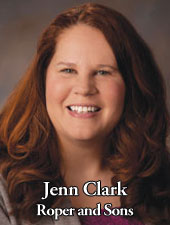 As losing a loved one is inevitable due to the natural order of things, it’s another major unplanned life change that we will all cope with at some point. “It almost goes without saying that death is one of the biggest unplanned life changes we as humans face,” poses Jenn Clark, Grief Counselor at Roper & Sons Funeral Care. “Of course, we all eventually will ‘shed this mortal coil,’ but none of us truly ever know the time or date that will happen.
As losing a loved one is inevitable due to the natural order of things, it’s another major unplanned life change that we will all cope with at some point. “It almost goes without saying that death is one of the biggest unplanned life changes we as humans face,” poses Jenn Clark, Grief Counselor at Roper & Sons Funeral Care. “Of course, we all eventually will ‘shed this mortal coil,’ but none of us truly ever know the time or date that will happen.
Even when that person is elderly, or challenged with a grave illness, facing the death of a loved one is not easy. One unplanned change that can be most difficult is when a spouse dies before a couple can experience all their goals are the most unplanned life changes I see most as a grief counselor. Many people come to our grief group and talk about the plans they had for after retirement and how those will never happen now. The most difficult aspect is to help them work through this loss. In some ways it is an additional loss to them on top of losing their spouse. I have not found the perfect solution yet, and there is not a miracle pill they can take to make the pain disappear. Listening to the person talk about their lost dreams and plans can go a long way. Being able to have the support of others that have the same loss helps people to see they are not alone. Some even decide to still follow through with a few of the plans in memory of their loved ones.
When discussing grief and the loss of the loved one there is no simple way to solve or fix unplanned life changes. If a person feels they need help with their grief, encourage them to talk to someone. It won’t fix it, but it will help to see they are not alone in their journey.”
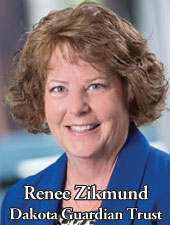 “The loss of a spouse or life partner may leave a huge void, both financially and emotionally,” agrees Renee Zikmund, Vice President and Senior Trust Officer at Dakota Guardian Trust. “An important first step is to talk to others about what you are feeling. Find a good listener that will offer you solid advice and guidance when you are ready to move forward and face the challenges ahead. Surround yourself with people you trust who will provide honest feedback. Seek out professional help if needed and never feel ashamed if you are having trouble coping with the loss.
“The loss of a spouse or life partner may leave a huge void, both financially and emotionally,” agrees Renee Zikmund, Vice President and Senior Trust Officer at Dakota Guardian Trust. “An important first step is to talk to others about what you are feeling. Find a good listener that will offer you solid advice and guidance when you are ready to move forward and face the challenges ahead. Surround yourself with people you trust who will provide honest feedback. Seek out professional help if needed and never feel ashamed if you are having trouble coping with the loss.
Furthermore, make sure you and your loved ones have a solid estate plan in place. Your estate planning documents may include Powers of Attorney for both financial transactions and healthcare decisions as well as a Will directing your Personal Representative as to how your assets should be distributed upon your death. In certain circumstances an individual or couple may want to establish a trust during their lifetime or at death to take care of loved ones, a charity or even a pet. A comprehensive estate plan will provide many benefits upon an unplanned life altering event. It is also important to contact anyone that helps you financially as soon as possible. Your financial advisor can assist you in restructuring your assets if needed so that all financial transactions can be completed easily.
No one can ever be fully prepared for the loss of a loved one, but having an updated estate plan may help you and your family address the most critical issues.”
While life’s unplanned changes are inevitable, moving past them is too as “time stops for no one.” Life happens and we can choose to be prepared or we can choose to react when the time comes. Lincoln has far too many valuable resources available to get stuck in the latter category and forced to make decisions in the midst of a crisis. Whether you just want to talk about a few things or need assistance with a major life change, the help you need is just a phone call or a visit away!

